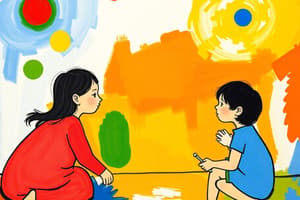Podcast
Questions and Answers
Where was Maria Montessori born?
Where was Maria Montessori born?
- Venice, Italy
- Florence, Italy
- Milan, Italy
- Rome, Italy (correct)
What was Maria Montessori's profession?
What was Maria Montessori's profession?
- Lawyer
- Psychologist
- Teacher
- Doctor (correct)
What was the name of Maria Montessori's first school?
What was the name of Maria Montessori's first school?
- Italian Academy
- Casa dei Bambini (correct)
- Montessori School
- Rome Elementary
What is the core principle of the Montessori method?
What is the core principle of the Montessori method?
What is the term for the specially designed learning materials used in Montessori education?
What is the term for the specially designed learning materials used in Montessori education?
What is the term for the idea that children learn through independent activity and self-directed exploration?
What is the term for the idea that children learn through independent activity and self-directed exploration?
Flashcards are hidden until you start studying
Study Notes
Early Life and Education
- Born on August 31, 1870, in Rome, Italy
- Parents: Alessandro Montessori and Renilde Stoppani
- Graduated from the University of Rome La Sapienza Medical School in 1896, becoming one of the first female doctors in Italy
Career
- Worked in psychiatric clinics and asylums, observing and working with special needs children
- Developed an interest in education and child development
- Established the first Montessori school, Casa dei Bambini, in Rome in 1907
- Developed the Montessori method, emphasizing self-directed learning, hands-on activities, and specially designed materials
Montessori Method
- Focus on individualized instruction and child-centered learning
- Emphasis on practical life skills, sensory integration, and academic preparation
- Use of specially designed materials, such as blocks, puzzles, and manipulatives
- Trained teachers to observe and support children's learning, rather than lecture or dictate
Key Principles
- Autoeducation: Children learn through independent activity and self-directed exploration
- Prepared Environment: Classrooms designed to promote independence, freedom of movement, and discovery
- Sensitive Periods: Children experience intense periods of sensitivity to learning specific skills or concepts
- Self-Correction: Children learn to correct their own mistakes and develop self-assessment skills
Legacy
- Montessori schools and programs established worldwide
- Influenced early childhood education and child development theories
- Inspired other educational approaches, such as Reggio Emilia and Waldorf education
- Remains a prominent figure in the history of education and child development
Early Life and Education
- Maria Montessori was born on August 31, 1870, in Rome, Italy
- Her parents were Alessandro Montessori and Renilde Stoppani
- She graduated from the University of Rome La Sapienza Medical School in 1896, becoming one of the first female doctors in Italy
Career
- Montessori worked in psychiatric clinics and asylums, where she observed and worked with special needs children
- She developed an interest in education and child development
- She established the first Montessori school, Casa dei Bambini, in Rome in 1907
- She developed the Montessori method, emphasizing self-directed learning, hands-on activities, and specially designed materials
Montessori Method
- Focus on individualized instruction and child-centered learning
- Emphasis on practical life skills, sensory integration, and academic preparation
- Use of specially designed materials, such as blocks, puzzles, and manipulatives
- Trained teachers to observe and support children's learning, rather than lecture or dictate
Key Principles
- Autoeducation: Children learn through independent activity and self-directed exploration
- Prepared Environment: Classrooms designed to promote independence, freedom of movement, and discovery
- Sensitive Periods: Children experience intense periods of sensitivity to learning specific skills or concepts
- Self-Correction: Children learn to correct their own mistakes and develop self-assessment skills
Legacy
- Montessori schools and programs established worldwide
- Influenced early childhood education and child development theories
- Inspired other educational approaches, such as Reggio Emilia and Waldorf education
- Remains a prominent figure in the history of education and child development
Studying That Suits You
Use AI to generate personalized quizzes and flashcards to suit your learning preferences.




